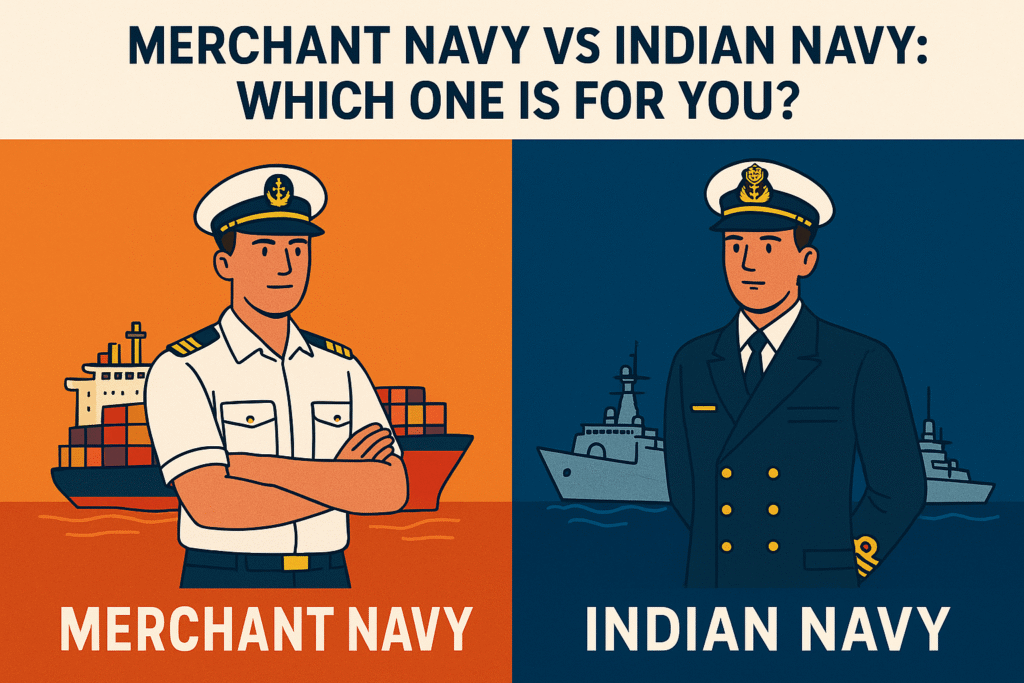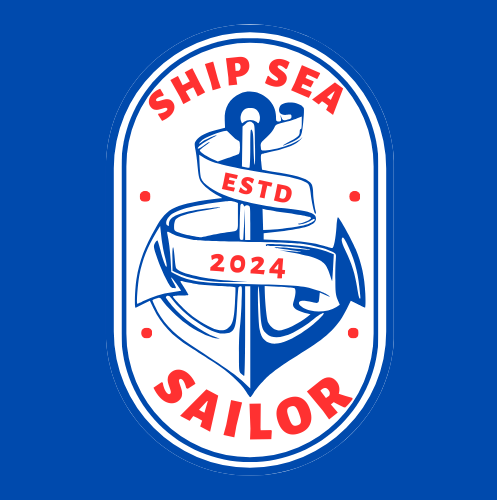If you’re drawn to the vastness of the sea and dream of wearing a uniform, two career paths immediately stand out—Merchant Navy and Indian Navy. Both offer unique opportunities and experiences, but the lifestyle, purpose, and nature of work in each are drastically different. So, how do you choose between the two?
Let’s dive deep into the world of sea warriors and sea traders to help you decide which path suits your goals, personality, and aspirations.

1. Basic Difference: Civilian vs Military
- Merchant Navy is a civilian profession focused on commercial shipping. Its primary role is to transport cargo and passengers across the globe.
- Indian Navy is a military force, part of the Indian Armed Forces. It is responsible for defending the nation’s maritime borders, engaging in combat, and conducting rescue missions during natural disasters or wartime.
👉 If you’re interested in adventure, travel, and high salary, the Merchant Navy might appeal to you.
👉 If your heart beats for patriotism, discipline, and service to the nation, the Indian Navy is your calling.
2. Entry & Eligibility
Merchant Navy:
- Entry starts after Class 10 or Class 12 with PCM (Physics, Chemistry, Math).
- You can join through Diploma/Graduate programs like B.Sc Nautical Science, B.Tech Marine Engineering, or GP Rating Course.
- Medical fitness and eyesight standards are required.
- No entrance exam needed for many private institutions, but reputed colleges like IMU-CET and Tolani Maritime Institute conduct entrance tests.
Indian Navy:
- You need to clear National-level exams like NDA, CDS, or INET, depending on the entry scheme.
- For officer ranks, candidates must have passed Class 12 with PCM (for NDA) or have a graduation degree (for CDS/INET).
- Medical fitness and eyesight criteria are stricter.
- SSB interview and training at NDA/INA is mandatory.
💡 Key Tip: Indian Navy requires a deeper level of academic and physical preparation compared to the Merchant Navy.
3. Nature of Work
Merchant Navy:
- Transporting goods like oil, gas, containers, and passengers across international routes.
- Job roles include Deck Officers, Marine Engineers, Electro-Technical Officers, and Ratings.
- Mostly automated operations with long working hours during voyage.
Indian Navy:
- Safeguarding maritime borders, surveillance, anti-piracy, submarine operations, aircraft carrier missions, and disaster relief.
- Job roles include Naval Officers, Technical Officers, Submariners, Pilots, and Sailors.
- Demands 24/7 alertness and readiness for deployment anywhere.
🌊 Merchant Navy = Trade and Transport
⚓ Indian Navy = Strategy and Security
4. Salary & Benefits
Merchant Navy:
- One of the highest-paying professions.
- Freshers (Deck Cadets/Engine Cadets) start at ₹30,000–₹60,000/month.
- Senior officers (Chief Engineer, Captain) earn ₹3–6 lakh/month or more.
- Additional benefits: tax-free income (for NRI seafarers), travel perks, multinational work environment.
Indian Navy:
- Starting salary for officers is around ₹60,000–₹80,000/month + allowances.
- Free housing, rations, medical, education for children, pension, and lifetime job security.
- Promotions come with experience and departmental exams.
💰 Merchant Navy = High Income, No Pension
🛡️ Indian Navy = Moderate Income, Lifetime Benefits
5. Lifestyle & Work Schedule
Merchant Navy:
- Work for 6–9 months, then get 3–6 months of leave.
- Long periods away from family, limited social life onboard.
- Exposure to different cultures and countries.
Indian Navy:
- Stationed in Naval bases or ships, with defined duties and shifts.
- High discipline and regimentation.
- Family can stay in Naval housing, frequent postings.
🚢 Merchant Navy = Wanderlust & Solitude
⚓ Indian Navy = Structure & Brotherhood
6. Job Security & Career Growth
- Merchant Navy offers rapid promotion based on sailing hours and exams but no permanent job security unless you work with PSU companies like SCI.
- Indian Navy ensures permanent commission and job till retirement, with post-retirement benefits and opportunities in coast guard or administration.
7. Risk Factor
- Merchant Navy faces natural risks (storms, mechanical failures) and piracy in sensitive regions.
- Indian Navy faces both natural and combat risks, including war, submarine or aerial threats.
🛡️ Both require courage—but the Indian Navy demands higher mental and emotional resilience.
8. Suitability: What’s Right for You?
Choose Merchant Navy if:
- You want a high-paying job without the military routine.
- You’re comfortable working with international crews and being away from home.
- You enjoy the technical side of maritime trade.
Choose Indian Navy if:
- You have a passion for serving the nation.
- You seek a well-respected life with structured discipline.
- You value teamwork, leadership, and long-term career stability.
Conclusion
Both Merchant Navy and Indian Navy offer unique life experiences. While the Merchant Navy is a financially rewarding career with a commercial focus, the Indian Navy promises honor, discipline, and lifelong service to the nation. The final choice depends on your personal values, career goals, and lifestyle preferences.
No matter which path you choose—be it the trading ships or the warships—you’ll be joining a proud community of men and women who conquer the seas with courage and skill. 🌊🇮🇳
Table of Contents
Explore More Exciting Posts Here!
Female Mariners: Breaking Waves in a Male-Dominated Industry (2025)
Carnival Mardi Gras cruise ship is the Ultimate Sea Adventure
10 Shipping Companies Powering World Trade
Chhaava Movie : A Grand Tribute to Chhatrapati Sambhaji Maharaj
Dabba Cartel 2025 : A Thrilling Crime Drama Series on Netflix
